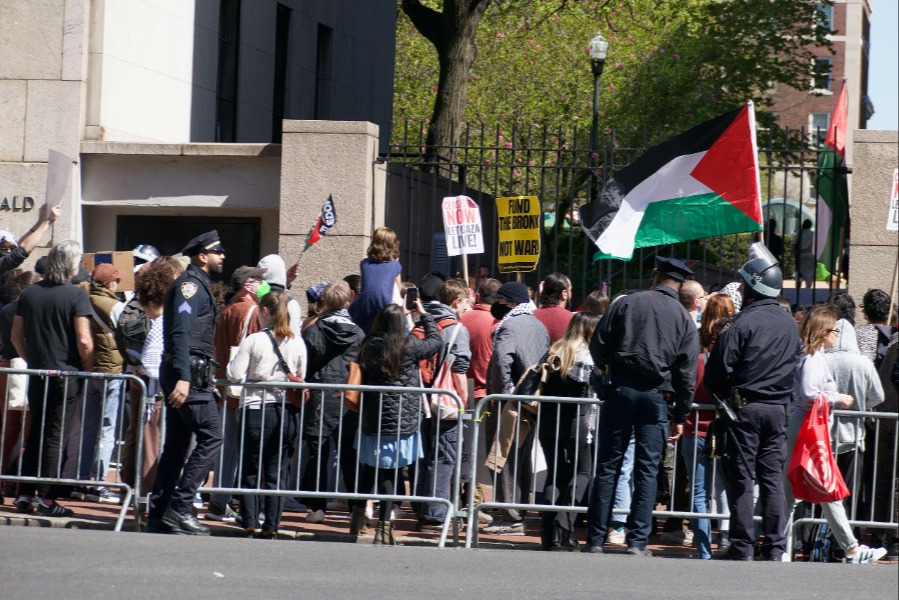Material Support for Terrorism: Florida Crew
Last Thursday in the Southern District of Florida, three men from Palm Beach County were charged via complaint with material support to terrorism. Gregory Hubbard, 52, Darren Arness Jackson, 50, and Dayne Atani Christian, 31 were all arrested after Hubbard tried to board a plane at Miami International Airport—the first leg of his trip to Syria.
Published by The Lawfare Institute
in Cooperation With

Last Thursday in the Southern District of Florida, three men from Palm Beach County were charged via complaint with material support to terrorism. Gregory Hubbard, 52, Darren Arness Jackson, 50, and Dayne Atani Christian, 31 were all arrested after Hubbard tried to board a plane at Miami International Airport—the first leg of his trip to Syria. The complaint also charges Christian, who was convicted in 2010 of making a false statement to a firearms dealer in connection with the acquisition of firearms, of being a felon in possession of a firearm.
The complaint, which appears to be based almost exclusively on the reporting of one FBI source, follows a familiar arc. According to the complaint, almost one year ago, Hubbard, an ISIL supporter, confided in an FBI source that his friend Christian was in contact with ISIL members. Hubbard later introduced the source to both Christian and Jackson, who also expressed interest in travelling overseas to join ISIL. For several months, all three men continued to meet and discuss their support for the terrorist group with the source who was posing as an ISIL sympathizer and wannabe traveller. As Hubbard and the source prepared to leave the United States, the men conducted firearms training on several occasions. On Thursday, all three men were arrested after Hubbard and the source passed through TSA security and attempted to board their flight to Germany.
While the complaint follows a fairly routine narrative, the story of how Hubbard, Jackson, and Christian came to be charged with material support is also fairly unique when considered in the context of recent complaints.
Right off the bat, all three of the subjects are much older than your typical American terrorism subject. Hubbard and Jackson are both in their fifties, while at 31 years old, even Christian is significantly older than your typical ISIL sympathizer. Mahmoud Amin Mohamed Elhassan, Bailor Jalloh, Nicholas Teausant, Mohammed Jamal Khweis, Muhanad Badawi, and Nader Elhuzayel were all in their early to mid-twenties when they were charged, and Akram Musleh was only eighteen years old. The complaint doesn’t go into detail about what these presumably more established men were leaving behind, whether that be careers or families, except to reference Christian being arrested at his place of work and a brief mention of his wife.
Perhaps due to the wisdom that comes with age, the complaint indicates that the men spent more time justifying their choices than their younger counterparts. They reasoned that ISIL had set up a true Caliphate, complete with currency, laws and charities. Moreover, since the United States is “legally at war” in Syria, offensive jihad in the United States was warranted. But like the twenty-somethings who came before them, they also had moments where they lost their cool. In early December, while eating at a restaurant with the source, Hubbard, reacting to the San Bernardino shooting, stood up in the middle of the restaurant and loudly proclaimed that he didn’t care how many Americans and infidels were killed.
Their target choices were also fairly predictable. Like so many counterterrorism subjects, the men discussed military targets. After deciding that the Pentagon would be too difficult to attack, they chatted about killing an individual who worked out at their gym in a Marines t-shirt. Several months earlier, Akram Musleh had also toyed with the idea of conducting an attack on military personnel in Florida and many other cases have had ties to the military via the subjects themselves—both Jalloh and Teausant had at one point been members of the Army National Guard prior to popping onto the FBI’s radar.
Not surprisingly, Hubbard, Jackson and Christian all supported Nidal Hassan’s shooting at Fort Hood, as well as the normal cast of characters—Anwar Aulaqi and Osama Bin Laden are both referenced as inspirations in the complaint. The men also discussed Abu Mohammed al Adnani, ISIL’s spokesperson, with the source. While prolific online, and a State Department designated terrorist, this is the first complaint in recent months where the subjects actually reference the media guru and his influence on their decision to join ISIL.
Perhaps the most alarming difference between Hubbard, Jackson, Christian and their younger predecessors, is the amount of operational training the men engaged in prior to travel. Beginning in early June, a combination of the three men and the source went to the target range on three separate occasions, preparing to join the battlefield in Syria. Reading the complaint, it’s difficult to keep track of the numbers of guns the subjects had access to. Christian appeared to be the gun enthusiast of the group providing the other subjects and the source with AK-47 assault rifles, semi-automatic pistols, and shotguns. At one point he boasted that he only used ammunition that would inflict maximum damage: “I want something that’s gonna take your leg off if I hit your leg or take your arm off if I hit your arm, that’s just me and but me and my situation, being a thug.” Hubbard also provided his own firearms and all three subjects instructed the source while at the range. No recently charged subject has approached this level of operational training. Jalloh may have come the closest, but even his purchases of a handgun and an inert assault rifle look shockingly mild when compared to the Florida group.
Although gun enthusiasts, these men were less sophisticated than previous travelers when it came to technology. Unlike Farrokh, Elhassan, Badawi and Elhuzayel, none of the men appeared to use encrypted messaging apps, according to the complaint. While the Internet still played a significant role in their radicalization process, with the men routinely sending each other links to online propaganda, the group didn’t have extensive contact with ISIL members. In fact, it’s unclear if some of them had any contact at all. According to the government, Hubbard told the source that he had submitted several articles to ISIL for publication, his most recent piece dealing with the media’s mistreatment of ISIL. Christian at one point told the source that he had direct contacts in ISIL, but by June said they had all been compromised.
While their contacts may have been lacking, the men did exercise a certain level of operational security and decided to use coded language to refer to ISIL—“soccer” was code for ISIL, and “playing soccer” meant joining ISIL. The choice of words is somewhat ironic for a terrorist organization that has allegedly executed teenage boys for watching a soccer match on television. When booking his travel, Hubbard also took steps to avoid law enforcement detection. Like the Minnesota crew, he purchased a round-trip ticket, although his destination was Berlin. From there he planned to take the train to Istanbul, before crossing into Syria. While other subjects have used Jordan as a transit point, or flown directly to Istanbul, Hubbard wasn’t the first subject to travel to Europe en-route to Syria– Khweis and Bilal Abood both successfully traveled through Europe on their way to Syria.
The defendants are currently awaiting their detention hearing that will take place on July 27, 2016, before being arraigned on August 5, 2016.





